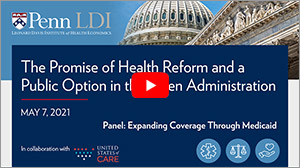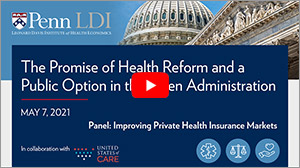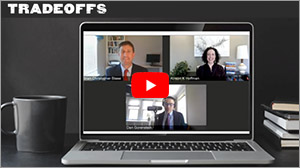Health Care Access & Coverage
Blog Post
Meeting the Moment at Penn LDI’s Health Reform Conference
The Art of the Possible
“There are decades when nothing happens, and there are weeks when decades happen…that describes what’s happening right now,” said Sen. Tom Daschle, at Penn LDI’s recent conference on health care reform. An unusual mix of optimism and pragmatism pervaded the conference sessions, as participants acknowledged the serious ideological divides that threaten any large-scale reforms. At the same time, they pointed out the possibilities of this political moment as the nation emerges from the pandemic.
In a keynote conversation with Zeke Emanuel, Sen. Daschle offered his perspective as a long-time politician and veteran of health reform efforts. Citing the Biden’s Administration trillion-dollar relief and infrastructure plans, he noted that this may be a moment of great political action that we haven’t seen since the Johnson Administration passed Medicare and Medicaid. But given the slimmest of margins in the House and Senate, passing in health reform will depend on the legislative vehicles available to the Administration, such as the reconciliation process or omnibus appropriations. Both Daschle and Emanuel pointed to the progress that is possible in areas that could overcome this political and ideological divide, including public health, mental health, opioids, and telehealth initiatives.
Opportunities to Expand Medicaid in the 12 Holdout States
In the first conference panel, Laura Wherry presented the evidence that the ACA expansion of Medicaid had improved insurance coverage and financial stability of low-income populations. Beneficiaries gained access to medical care, resulting in earlier detection and treatment of cancers, and reduced disease-related mortality. Given the evidence, what’s stopping the remaining states from expanding Medicaid? Again, pragmatism ruled the day, as panelists pointed out that the debate about Medicaid expansion is not about money or policy, but politics. And in response to the impasse created by ideology, panelists looked to avoid all-or-nothing approaches, optimistic that a politically palatable, middle ground could be found in non-expansion states. These ideas included increasing subsidies in the marketplace (so that coverage is free to low-income people) auto-enrolling low-income people to achieve universal eligibility, or putting people at poverty level in Medicaid and the remainder in the marketplace.
A Public Option for Employers?
This optimism continued in a live Tradeoffs episode about employer-sponsored health insurance, and how to address affordability in the market where most of us obtain our coverage. We heard two very different pitches for innovative changes, from different ends of the spectrum of government involvement. Allison Hoffman pitched an employer-sponsored public (government) option, which would pay providers at Medicare-level rates. In a Shark Tank-like presentation to a panel of three employers, she said the option could save employers and employees money, and prevent large increases in costs in the future. She noted that it could also increase choice in what matters most to employees: where they can go for care. She concluded that employers would find that the public option would simplify how they provide health insurance, because it would free employers and employees from the annual hassle of selecting health plans, and could allow employees to take their coverage with them if they change jobs.
On the other end of the ideological spectrum was a pitch by Bill Blasé for individual coverage health reimbursement accounts (ICHRAs), where employees take their tax-free contributions and buy the coverage they need. Similar to Hoffman, he claimed that this approach would reduce employer costs, maximize employer and employee choice, and simplify the whole process. He noted that ICHRAs are the “401k of health insurance,” where the employer’s role is limited to setting a budget and contribution amounts, deciding which employees to cover, and hiring a vendor to help employees pick the right coverage. He noted that this option won’t work for all employers, because the individual market is weak in many places.
The “sharks” in this case, a panel representing the voice of small and large employers, responded to both pitches with their perspectives as businesses that need to survive and turn a profit, while acting in their employees’ best interests. While they were naturally skeptical of government approaches, they seemed willing to entertain different alternatives to increase affordability, give their employees choice, and simplify their own process for providing coverage. They emphasized their interest in getting beyond the ideological divides as well, and stated a willingness to test a range of innovations.
The Future of the ACA Marketplaces
The final panel captured where we are at this moment, agreeing that the Biden Administration’s short-term changes to the ACA will help people gain affordable coverage in the marketplace. But no one is content to rest on these changes, because fundamentally, the underlying costs of our system remain unaddressed. Here is where there was less consensus, about the longer-term role of private insurance and government in financing these costs and providing universal coverage. While recent (though temporary) changes have improved affordability in the marketplace by increasing subsidies, it did so at a high cost. Is the public option a feasible solution at the federal or state level, or is it a solution in search of a problem? Should private insurers pay Medicare or public rates, and what would happen to providers if they do? Or should there be broad budget targets, and leave it to private plans to figure out how to live within these limits? In a nutshell, here is where optimism meets pragmatism, as the panelists encouraged us to “look at what’s possible, and reach for what’s attainable.”
The conversations during the conference were energizing and challenging. Has the pandemic accelerated the appetite for health insurance reform, and for longer-term solutions to what have seemed like intractable problems? In a nation with deep partisan divides, it is tempting to be pessimistic about the prospects for reform. And it can be hard to appreciate a moment of great change, except in retrospect. But the conference sketched out potential paths forward that might allow us to go beyond ideology and find common ground.


